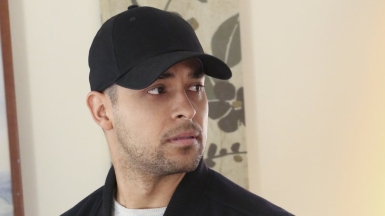Holiness is one of those 'tricky' Christian words isn't it? We know that we are holy in God's eyes because of Jesus, but we also know that we are called to live holy lives. So why do many of us feel confused or condemned when we think about holiness?
We can get ourselves tied up in knots over the way God chose to make His people holy in the Old Testament, or over the countless times we try to be holy but mess things up. Here are some things I have been reminded about holiness as I've been studying the subject afresh:
1. God chose to dwell with His people
It is quite incredible to think that the God of the universe, who is the personification of holiness, would chose to come down to earth and dwell with His chosen people, the Israelites. We often get fixated on the weird, lengthy and at times gruesome list of laws and sacrifices He gave them that we forget this fundamental truth.
When we do ponder the things He asked them to do, we can see that much of it was for their protection. It was also so that they could have their God in their midst, as without the necessary sacrifices and the Holy of Holies to contain God's presence, His holiness would have simply consumed them. Such is the incredible nature of holiness. We should be in awe of it.
2. A holy God required a perfect sacrifice
The parallels between the Old Testament sacrifices of unblemished lambs were but a foretaste of the sacrifice Jesus would make for us. They point the way to Him, but also reveal how a blood sacrifice was necessary in order for us to be able to have a right standing before our holy God. His very nature means He cannot stand sin of any form and so we need the protection of the holiness Jesus' sacrifice won for us.
3. Becoming holy is a process
When we accept Jesus we are made holy – God does look on us and see the holiness of Jesus. And yet there is a process to living in the good of our new identity. We can beat ourselves up about how we've missed the mark, yet again, but then fail to get to the root of why we've failed.

Perhaps it happens because we don't fully comprehend everything Jesus has done from us. The fact is, He has taken us from one kingdom and put us in His – so we don't have to be held by those sins that we seem to be forever locked into. The battle to break free from them can often be in our thinking. Jesus has already taken away the power of sin for good, but we are told in Romans 6:11 to 'count yourselves dead to sin'. So we need to take some action ourselves to lay hold of this truth. Sometimes that means practically rejecting thoughts that lead to sin and replacing them with biblical truth (see Romans 12:2).
Jerry Bridges, in The Pursuit of Holiness, explains: "It is our habit to live for ourselves and not for God. When we become Christians, we do not drop all this overnight. In fact, we will spend the rest of our lives putting off these habits and putting on habits of holiness."
4. We are to pursue the discipline of being holy
In Romans 12:1 Paul urges us to 'offer your bodies as a living sacrifice, holy and pleasing to God'. While we can be made holy only through Jesus we have choices to make every day about whether we will lay down our own agendas and offer our lives up to God.
I think that we can shy away from thinking about our part in the journey towards holiness. And yet, as Kevin de Young puts it in The Hole in our Holiness: "The Bible clearly teaches that holiness is possible. This is good news, not bad news ... You are allowed (and expected) to be obedient. You cannot do anything to earn God's love. But as a redeemed, regenerate child of God you don't have to be a spiritual failure."
Colossians 1:22-24 says: "he has reconciled you by Christ's physical body through death to present you holy in his sight, without blemish and free from accusation -- if you continue in your faith". Again this shows our part: we must 'continue in our faith' in order to live a holy life. Rather than telling us that we need to 'do' in order to please God, the word Paul uses here is axios, which means 'in a manner that is worthy', or 'in a way that is fitting'. So he is talking about us learning to live in a way that befits our new identity as holy children of God. The joy and mystery of this is that we do not do it through our own efforts but through the Holy Spirit's enabling.
5. The process shouldn't be arduous: it's about getting closer to God
I love the following quote from de Young as I think it turns our understanding of pursuing holiness on its head (which can seem like hard work and huge effort): "To run hard after holiness is another way of running hard after God". It isn't holiness as an end in itself that we are seeking, but the One in whom it is all hidden: Jesus. Yes, we must learn to discipline ourselves, but the key to fully grasping the gift of holiness is in reaching closer to the One who gave it to us in the first place.



















